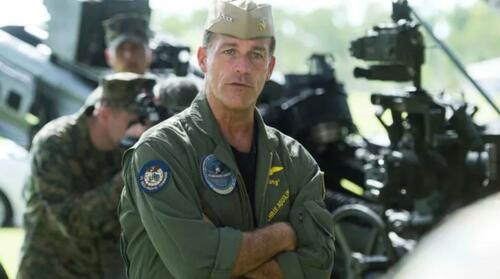Pacific Fleet Commander Says US Must Be "Prepared" For China To Retake Taiwan
Earlier today, Treasury Secretary Janet Yellen told CNBC that the US presently has no plans to sanction China for tacitly aiding Russia in the Ukrainian war effort. Of course, that will likely change when Beijing finally makes its move on Taiwan.
Following yesterday's report about a landmark new security deal between the PRC and the Solomon Islands, the commander of the US Pacific Fleet - who has repeatedly warned about China's increasingly aggressive military "boldness" that has been on display over the past year - told the FT in an interview that the US must be "prepared" for China to move on Taiwan (which Washington would be treaty-bound to defend).
Admiral John Aquilino, head of Indo-Pacific Command, said China had displayed a "boldness" over the past year that ranged from its increasingly assertive military activity near Taiwan and other parts of the South China Sea to its rapid nuclear expansion and a hypersonic weapon test in July.
While many Americans remain ignorant of the possibility of an imminent invasion, Aquilino noted that a lot can change in the span of just a few months. Take the situation in Ukraine, for example. Five months ago, few expected that Russia would launch such a "special military operation."
"I don’t think anyone five months ago would have predicted an invasion of the Ukraine. So I think the number one lesson is: 'Hey, this could really happen.'"
Aquilino told the Financial Times during his first visit to Australia as head of US forces in the Indo-Pacific. "Number two, don’t be complacent...We have to be prepared at all times."
One indication of China's increasingly aggressive military posture: it's increasingly aggressive military drills, as it sends warplanes to intimidate Taiwan by flying through the island's airspace.
"Their operations have certainly changed specifically as it applies to their operations around Taiwan - increased maritime and air operations that are designed as a pressure campaign against the people of Taiwan," Aquilino said in his first wide-ranging interview since assuming command at Indo-Pacom last April.
"I wouldn’t say I’m more concerned, but I do see increased pressure, and we have to make sure we are prepared should any actions get taken," added Aquilino, who commanded the US Pacific Fleet before Indo-Pacom.
Aquilino also discussed China's development of Hypersonic weapons: missiles that fly faster than the speed of sound. The weapons have recently been employed by the Russian military in targeted strikes on Ukrainian targets.
Asked whether the hypersonic weapon was designed to target the US or facilitate an attack on Taiwan, Aquilino said it was an "offensive capability" - not a defensive weapon - that had "many applications".
"I don’t think it was built for a specific one, but it certainly destabilises the region," he said. "That capability that could be applied against any partner in the region."
The "very steep increase" in China’s nuclear arsenal is another cause for alarm, Aquilino said. The Pentagon projects the PRC's nuclear arsenal will surpass 1,000 warheads this decade. He added that Indo-Pacom was working with Strategic Command, which overseas US nuclear forces, to provide an "integrated deterrence" against the growing nuclear threat.
In the face of an increasingly aggressive China, the US is relying more and more on security cooperation with its allies, particularly its partners in "the Quad", the security-oriented cooperation between the US, Australia, Japan and India that Beijing has obliquely criticized as a "Pacific NATO".
"We’re synchronising more and more with our allies and partners," said Aquilino, pointing to a recent military exercise that involved seven countries and four aircraft carriers. "Bringing that credible combat deterrent force and operating forward with our allies and partners is one of the key focus areas." Asked what role Australia and Japan would play in any Taiwan conflict, he said they would have to decide for themselves but said the US wanted to be ready to operate with its allies. "What we want to continue to do is to operate together, train together...so that whatever decisions those policymakers choose, we’re ready to be able to respond as tasked."
Cooperation in peacetime is one thing. But the big question is: can these partners be relied upon to assist the US in helping the Taiwanese repel an invasion? That, of course, remains to be seen.
https://ift.tt/18WL0jT
from ZeroHedge News https://ift.tt/18WL0jT
via IFTTT





0 comments
Post a Comment